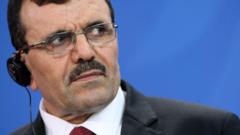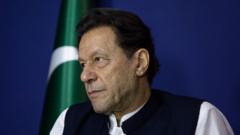The conviction of Ali Laarayedh, reflecting growing concerns over authoritarianism in Tunisia, marks a significant escalation in the crackdown on political dissent under President Kais Saied.
Former Tunisian Prime Minister Sentenced to 34 Years on Terrorism Charges

Former Tunisian Prime Minister Sentenced to 34 Years on Terrorism Charges
Ali Laarayedh, ex-prime minister of Tunisia, faces a lengthy prison sentence amid allegations of politically motivated trials aimed at silencing dissent.
A Tunisian court has sentenced former Prime Minister Ali Laarayedh to an extensive 34 years in prison on multiple terrorism charges, stirring debate over the legitimacy of the current government's legal actions. Laarayedh, who led the moderate Islamist party Ennahda and opposed President Kais Saied, claims the charges are a guise for political persecution as he faces accusations of orchestrating a terrorist cell and facilitating Tunisian youths' travel to conflict zones in Iraq and Syria.
In a letter sent to the court’s prosecutor, Laarayedh stated, "I am not a criminal... I am a victim in this case," underscoring his assertion that his prosecution is politically motivated. His sentencing on Friday adds him to a growing list of political opponents of Saied imprisoned in recent weeks, including diplomats, lawyers, and journalists.
Human rights organizations label the trials as "sham trials," attributing them to President Saied's increasing authoritarianism since he dissolved parliament in 2021. Following his election six years ago, Saied has altered the constitution to consolidate his control, an assertion of power that many Tunisians believe has resulted in a regression of the democratic advances sparked by the 2011 Arab Spring.
Laarayedh was initially arrested three years ago, leading various advocacy groups, including Human Rights Watch, to demand his release. In their opposition, they describe this situation as a deliberate effort by Saied's administration to marginalize political opponents by labeling them as terrorists. Despite ongoing criticism from domestic and international observers, President Saied defends his actions as a necessary battle against "traitors" and interference from abroad.
The shifting political landscape in Tunisia continues to evoke concerns over the erosion of the democratic ideals once celebrated after the Arab Spring, with many citizens expressing apprehensions about their diminished liberty under Saied's regime.



















